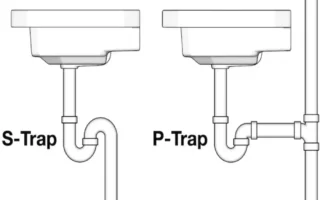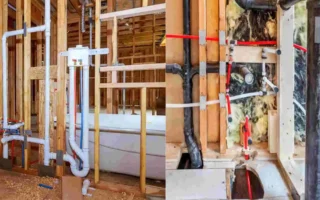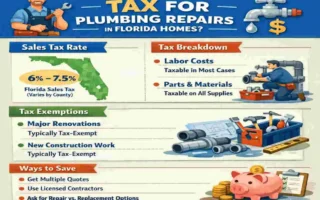When buying or selling a home, there’s often a lot of focus on location, square footage, and curb appeal. But one crucial element that doesn’t always get the attention it deserves is home plumbing. Plumbing is essential to a home’s functionality, and its condition can significantly affect a home’s value and marketability.
Understanding whether plumbing is considered a fixture is vital for both buyers and sellers because it can influence negotiations, legal contracts, and even the outcome of a sale.
What Defines a Fixture in Real Estate?

Before addressing plumbing specifically, it’s essential to understand what qualifies as a fixture in real estate. This is a legal concept that determines what items are considered part of the property and, therefore, transfer to the buyer during a sale.
Legal Definition of a Fixture
In real estate, a fixture is generally defined as any item that is permanently attached to the property. Unlike personal property, which the seller can remove, fixtures are considered part of the home and are included in the sale unless otherwise specified.
For example:
- A light fixture that’s hardwired into the ceiling is a fixture.
- A freestanding lamp, on the other hand, is personal property.
The “Intent Test”
Courts often use what’s called the Intent Test to determine whether an item is a fixture. This test examines:
- The purpose of the item – Was it installed with the intention of being a permanent part of the home?
- The context of use – Does the item serve a functional purpose for the property?
Method of Attachment and Adaptation
Two additional factors that help define fixtures are:
- Method of Attachment: If the item is physically or permanently attached to the property (e.g., screwed or nailed), it’s likely a fixture.
- Adaptation: If the item is customized to fit the home (e.g., built-in cabinets), it’s also considered a fixture.
Examples of fixtures include:
- Plumbing systems
- Built-in appliances (e.g., dishwashers)
- Ceiling fans
Non-fixtures might include:
- Freestanding appliances (e.g., refrigerators)
- Removable furniture
Why Plumbing Systems Matter in Real Estate Deals

Plumbing isn’t just a functional necessity—it’s also a significant factor in determining a home’s value and marketability. Let’s explore why plumbing systems play such a crucial role in real estate transactions.
Plumbing as Part of Home Functionality
Imagine a home without a working plumbing system. No running water, no functioning bathrooms, and no way to wash dishes or do laundry. Plumbing is one of the most essential systems in any home.
Impact on Home Value
Plumbing systems are deeply integrated into a home’s structure. If the plumbing is outdated or faulty, it can significantly reduce the home’s value. During property inspections, plumbing issues are often red flags for buyers, leading to renegotiations or even canceled deals.
Plumbing and Sale Negotiations
Buyers often use the condition of a home’s plumbing to negotiate for repairs, discounts, or contingencies. Sellers, on the other hand, may need to invest in plumbing upgrades or repairs to make their property more appealing.
Is Home Plumbing a Fixture in Real Estate?
Now, let’s answer the central question: Is home plumbing a fixture in real estate? The short answer is yes—home plumbing is considered a fixture. Here’s why:
Permanence and Integration
Plumbing systems are permanently installed within the walls, floors, and foundation of a home. They include pipes, faucets, sinks, and drainage systems that are integral to the home’s functionality.
Legal Precedents
Courts consistently rule that plumbing is a fixture because it meets all the criteria:
- It’s permanently attached.
- It’s adapted to serve the property.
- It’s intended to remain with the home during a sale.
Comparison to Other Fixtures
Plumbing is similar to other systems, such as HVAC or electrical wiring. It’s not easily removable without damaging the property, further solidifying its status as a fixture.
What Buyers Should Know About Home Plumbing as a Fixture
As a buyer, understanding the condition of a home’s plumbing is critical. Here’s what you need to keep in mind:
Inspecting Plumbing Systems
Before finalizing a purchase, ensure that a professional home inspector evaluates the plumbing. Key areas to check include:
- Water pressure and flow
- Condition of pipes (e.g., corrosion or leaks)
- Functionality of faucets, toilets, and showers
Asking About Maintenance
Don’t hesitate to ask the seller about the history of plumbing repairs or upgrades. Knowing whether the pipes are old or if the water heater has been replaced can save you from future headaches.
Red Flags for Buyers
Be cautious of common plumbing issues, such as:
- Low water pressure
- Leaking pipes
- Clogged drains
These problems can lead to costly repairs and may impact your decision to proceed with the purchase.
What Sellers Should Know About Home Plumbing as a Fixture

Sellers also have responsibilities regarding plumbing. Here are some tips to help you navigate this aspect of your sale:
Disclosure Obligations
In most states, sellers are legally required to disclose any known plumbing issues. Failure to do so can lead to disputes or even lawsuits after the sale.
Preparing for Inspections
Before listing your home, consider having the plumbing inspected. Addressing issues in advance can prevent surprises during the buyer’s inspection.
Repair vs. Replace
If your plumbing system is outdated, you may need to decide whether to repair specific components or invest in a complete upgrade. While repairs are often cheaper, replacements can increase the home’s marketability.




